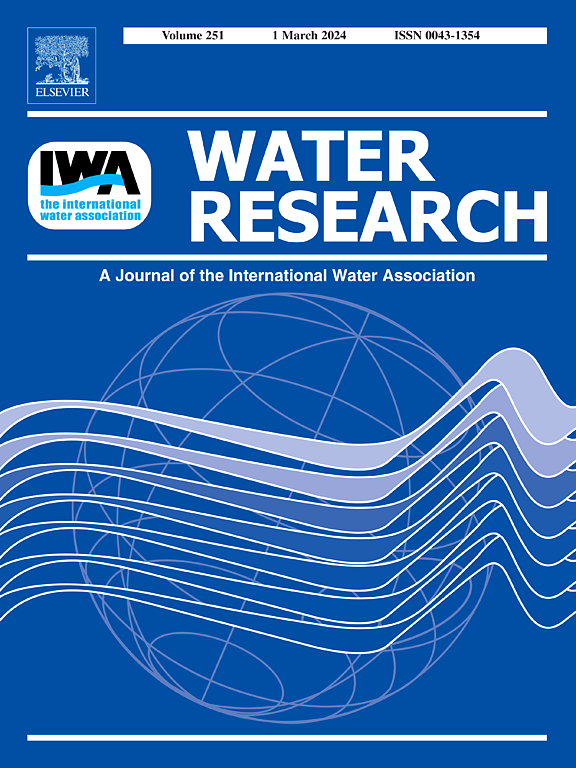人群免疫促进北京地区SARS-CoV-2的进化
IF 12.4
1区 环境科学与生态学
Q1 ENGINEERING, ENVIRONMENTAL
引用次数: 0
摘要
本研究旨在阐明人群免疫对SARS-CoV-2区域进化的影响。自2022年12月实施“动态零冠”政策调整后的11个月内,北京市共获得了3701个污水中SARS-CoV-2浓度值和168个污水中SARS-CoV-2全基因组。结果表明,通过废水监测鉴定出的变异菌株数量是临床监测的2.46倍,单核苷酸多态性最多增加7.14倍。加强监测有助于对区域病毒演变模式进行更全面的分析。在疫情措施调整后,北京市经历了三波明显的疫情,第一次疫情的主导变异在6个月后直接由第一次疫情的ba0.5型转变为第二次疫情的XBB型。在此期间,90%以上人群集中感染形成的强大人群免疫力阻止了国际流行的BQ.1和CH.1.1变体的爆发,导致北京SARS-CoV-2菌株的区域进化速度比国际快12.5%。随后,在2023年8月,eg5与国际趋势一致,成为第三波的主导变体。北京地区疫情对SARS-CoV-2毒株造成了显著的正选择压力,刺突基因抗原逃逸突变增强的毒株更受青睐。这些结果表明,疫情防控政策调整后的大范围感染加速了北京地区SARS-CoV-2的进化,有利于抗原逃逸进化,可有效地为疫情防控决策和预防性疫苗设计提供信息。本文章由计算机程序翻译,如有差异,请以英文原文为准。


Population immunity enhances the evolution of SARS-CoV-2 in Beijing revealed by wastewater genomic surveillance
This study aims to elucidate the impact of population immunity on the regional evolution of SARS-CoV-2. A total of 3701 wastewater SARS-CoV-2 concentration values and 168 wastewater whole genomes of SARS-CoV-2 were obtained in Beijing over 11 months following the implementation of the "dynamic zero-COVID" policy adjustments in December 2022. The findings indicate that the number of variant strains identified through wastewater surveillance was 2.46 times greater than that detected by clinical monitoring, with single nucleotide polymorphisms showing an increase of up to 7.14 times. This enhanced surveillance facilitates a more comprehensive analysis of regional virus evolution patterns. Following the adjustment of epidemic measure, Beijing experienced three distinct waves of epidemics, and the dominant variant transitioned directly from BA.5 in the first wave to XBB after six months in the second one. During this period, strong population immunity formed by centralized infection in over 90 % of the population blocked the outbreak of internationally prevalent and concerning variants BQ.1 and CH.1.1, resulting in a 12.5 % faster regional evolution of SARS-CoV-2 strains in Beijing compared to the international context. Subsequently, in August 2023, EG.5 became the dominant variant in the third wave, aligning with international trends. The epidemics in Beijing have caused significant positive selection pressure on SARS-CoV-2 strains, favoring those with enhanced antigenic escape mutations in spike gene. These results underscore that the extensive infection after the adjustment of epidemic prevention policies has accelerated the evolution of SARS-CoV-2 in Beijing and been conducive to antigenic escape evolution, which can effectively inform decision making for epidemic control and preemptive vaccine design.
求助全文
通过发布文献求助,成功后即可免费获取论文全文。
去求助
来源期刊

Water Research
环境科学-工程:环境
CiteScore
20.80
自引率
9.40%
发文量
1307
审稿时长
38 days
期刊介绍:
Water Research, along with its open access companion journal Water Research X, serves as a platform for publishing original research papers covering various aspects of the science and technology related to the anthropogenic water cycle, water quality, and its management worldwide. The audience targeted by the journal comprises biologists, chemical engineers, chemists, civil engineers, environmental engineers, limnologists, and microbiologists. The scope of the journal include:
•Treatment processes for water and wastewaters (municipal, agricultural, industrial, and on-site treatment), including resource recovery and residuals management;
•Urban hydrology including sewer systems, stormwater management, and green infrastructure;
•Drinking water treatment and distribution;
•Potable and non-potable water reuse;
•Sanitation, public health, and risk assessment;
•Anaerobic digestion, solid and hazardous waste management, including source characterization and the effects and control of leachates and gaseous emissions;
•Contaminants (chemical, microbial, anthropogenic particles such as nanoparticles or microplastics) and related water quality sensing, monitoring, fate, and assessment;
•Anthropogenic impacts on inland, tidal, coastal and urban waters, focusing on surface and ground waters, and point and non-point sources of pollution;
•Environmental restoration, linked to surface water, groundwater and groundwater remediation;
•Analysis of the interfaces between sediments and water, and between water and atmosphere, focusing specifically on anthropogenic impacts;
•Mathematical modelling, systems analysis, machine learning, and beneficial use of big data related to the anthropogenic water cycle;
•Socio-economic, policy, and regulations studies.
 求助内容:
求助内容: 应助结果提醒方式:
应助结果提醒方式:


